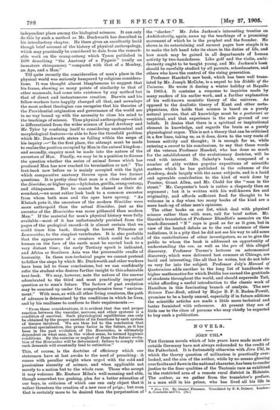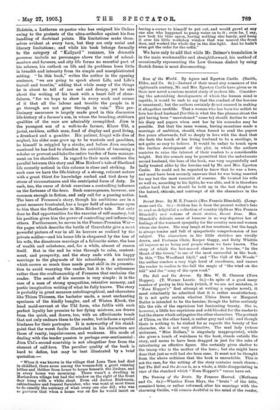JoRN DILL.*
THE German novels which of late years have made most stir outside Germany have not always redounded to the credit of the Fatherland. It is fortunately otherwise with .1bin Uhl, in which the thorny question of militarism is practically over- looked, and the aim of the author, while by no means glossing over faults and flaws in the national character, has been to render justice to the finer qualities of the Teutonic race as exhibited in the restricted area of a remote rural district in Holstein. The author, as we gather from the translator's preface, is a man still in his prime, who has lived all his life in
• Jern Uhl. By Gustav Fre
Holstein, a Lutheran ex-pastor who has resigned his Orders owing to the protests of the ultra-orthodox against his free handling of doctrinal points. His limitations make them- selves evident at every turn, but they are only social and literary limitations ; and while his book belongs formally to the category of " Kailyard " romance, his dramatis personae include no personages above the rank of school- masters and farmers, and city life forms no essential part of his scheme, his outlook on life and its problems loses little in breadth and intensity from its simple and unsophisticated setting. "In this book," writes the author in the opening sentence, "we are going to speak about Life, and Life's travail and trouble," adding that while many of the things he is about to tell of are sad and dreary, yet he sets about the writing of his book with a heart full of cheer- fulness, "for we hope to show in every nook and corner of it that all the labour and trouble the people in it go through are not gone through in vain." This pre- liminary assurance is largely made good in this discursive life-history of a farmer's son, in whom the brooding, stubborn qualities of the race are admirably exemplified. Jorn is the youngest son of a well-to-do farmer, Klaus Uhl, a jovial, reckless, selfish man, fond of display and good living, a drunkard and a gambler. His patient, frugal wife dies of neglect, his elder sons grow up to be wastrels and gamblers, be himself is crippled by a stroke, and before Jiirn reaches manhood he has had to abandon his ambition of becoming a scholar or provost and take the entire burden of farm manage- ment on his shoulders. In regard to their main outlines the parallel between this story and Miss Rickert's tale of Shetland life recently noticed in this column is close and striking. In each ease we have the life-history of a strong, reticent nature with a great thirst for knowledge curbed and tied down by stress of circumstances and the centripetal force of duty. In each, too, the curse of drink exercises a controlling influence on the fortunes of the hero. Such convergences, however, are common enough in fiction, and only call for a passing notice. The hero of Frenssen's story, though his ambitions are in a great measure frustrated, has a larger field of endeavour open to him than the Shetlander in Miss Rickert's tale. Not only does he find opportunities for the exercise of self-mastery, but his position gives him the power of controlling and influencing others. Furthermore, be serves in the Franco-Prussian War— the pages which describe the battle of Gravelotte give a most powerful picture of war in all its horrors as realised by the private soldier—and his home life is chequered by the loss of his wife, the disastrous marriage of a fa■murite sister, the loss of wealth and substance, and, for a while, almost of reason itself. But in the end he wins through to calm, content- ment, and prosperity, and the story ends with his happy marriage to the playmate of his schooldays. A narrative which covers so much time needs great skill in its presenta- tion to avoid wearying the reader, but it is the artlessness rather than the craftsmanship of Frenssen that enchains the reader. The secret of- his success is very simple : it is the case of a man of strong sympathies, retentive memory, and poetic imagination writing of what he fully knows. The story is probably in great measure autobiographical, and characters like Thiess Thiessen, the bachelor uncle, a most enchanting specimen of the kindly bungler, and of Wieten Klook, the head maid-servant at the Uhl farm, who fulfils. with such
perfect loyalty her promise to her dying mistress, are drawn from the quick, and drawn, too, with an affectionate touch
that not only endears them to the reader, but induces a special kindness for their portrayer. It is noteworthy of his stand- point that the worst faults illustrated in his characters are those of vanity, impulsiveness, and weakness. His mode of dealing with the tender passion is perhaps over-sentimental : Joni Uhl's second courtship is not altogether free from the element of calf-love. The peculiar quality of the book is hard to define, but may be best illustrated by a brief quotation :— "When it was known in the village that Lena Tarn had died in childbed, there arose among the women-folk a great running hither and thither from house to house beneath the lindens, and in every house was mourning. There wasn't a dwelling in Mariendonn village but had the window on the right of the front door hung with a white sheet. Even old Jocheu Rinkmann, cabinetmaker and funeral furnisher, who was wont at most times to do exactly the contrary of what every one else did ; who was so perverse that when a house was on fire he would insist on
having a corner to himself to put out, and would growl at any one else who happened to pump water on to it ; even he, I say, now took his blue apron, having nothing else handy, and hung it over his little workshop window that was nearest the front door, and worked the whole day in the dim light. And he hadn't even got the order for the coffin."
We have only to add that while Mr. Delmer's translation is in the main workmanlike and straightforward, his method of occasionally representing the Low German dialect by using Scotch forms is most disconcerting.







































 Previous page
Previous page